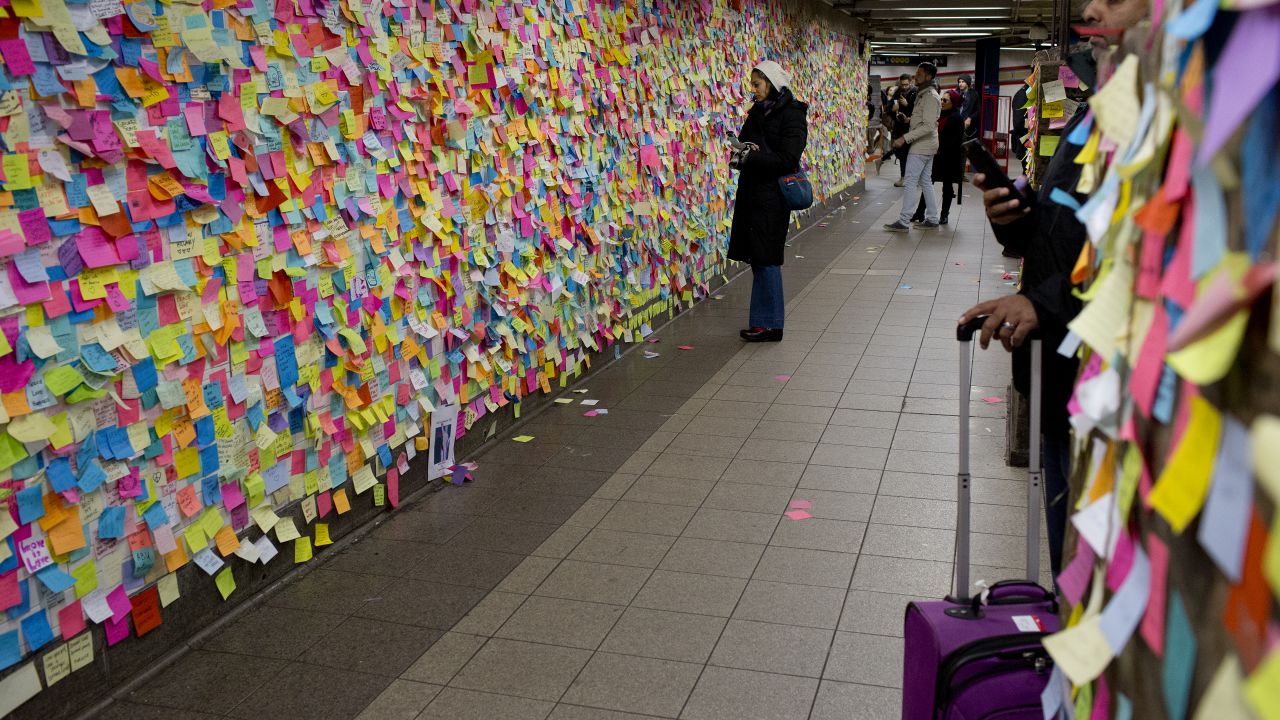
New Yorkers shocked and angered by the unexpected election of Donald Trump leave messages on colored note paper on the wall of the Union Square subway station in Manhattan on Nov. 22, 2016. The message board of post-its is an art project titled "Subway Therapy" by the artist Matthew Chavez. (Photo by Andrew Lichtenstein/Corbis via Getty Images)
This post originally appeared at Yes! Magazine.
The signs of defiance and compassion are everywhere. Cities from San Francisco to New York are defending their status as “sanctuary cities,” ready to defy Donald Trump’s promised orders that could lead to the deportation of more than 2 million immigrants. People are wearing safety pins on their shirts to signal their willingness to support vulnerable people who may feel unsafe. Main Street Alliance businesses are putting signs on their store windows — “All are Welcome Here” — to show that their business is a safe spot no matter what the identity of the patron.
Department of Energy officials refused to hand over the names of employees who work on climate change-related projects. Tech industry leaders declared they will not participate in creating a database for registering Muslims. Here’s their pledge: “We are choosing to stand in solidarity with Muslim Americans, immigrants and all people whose lives and livelihoods are threatened by the incoming administration’s proposed data collection policies. … We refuse to facilitate mass deportations of people the government believes to be undesirable.”
We are entering a time of testing.
Much that we hold dear appears under threat. We will be asked in new and sometimes frightening ways, “What do we stand for?” “What do we care about enough to risk ridicule, funding, a job, our lives?”
Many of us have not had to face such choices before. Sure, we act for what we believe in. We march. We write letters to the editor. We call our elected officials. We speak up at council meetings. We join committees. We donate. But at what risk? Often very little.
That may change.
If the cities that have so boldly defended their status as sanctuaries have their federal funding cut off, as the incoming Trump administration has threatened, will they stick with their resolutions? If the officials at the Department of Energy who refused to release the scientists’ names are told to obey or be fired, will they hold out? What if we speak up at a community meeting and then find a burning cross in the front yard? How long will our noble defiance last? When does our fear overcome our good intentions?
We are likely to need a strong dose of fortitude in the days and years ahead. We will need to support each other in new ways. We must not stand silently when someone else is speaking up for justice and compassion. There really is safety in numbers — especially when those numbers are large.
The good news is that people are coming together. I am hearing from people across the country who are meeting in newly formed neighborhood groups to figure out new strategies, new defenses. I’m seeing deep conversations parsing out precisely how our government works to determine the best levers for stopping the bad and promoting the good. The Jan. 21 Women’s March on Washington is calling for women to come together in solidarity and resolve. Related marches are planned for other cities. There’s a new ferment in the land that bodes well for the long term.
As we are tested, it is important to remind ourselves that allies are everywhere, even where we least expect them.
Within government agencies at all levels are good people who went into public service because they wanted to serve the public good. They can be important allies, especially with their expert knowledge of how the government works. We may be surprised by who in Congress will stand up for values and programs we care about. In the Supreme Court, justices we may have dismissed as too corporate-friendly given their stance on Citizens United may step up to be guardians of basic freedoms. Even large corporations may sometimes be allies — like the 360 companies and investors that recently sent an open letter to Trump urging him to stick with the Paris accords on climate change. There are Trump voters who may be wonderful allies on initiatives that help our localities and livelihoods become more sustainable and fair — and may join progressives in supporting some of the national programs we care about.
By coming together to pool our wisdom and support one another, by welcoming unexpected allies who share some of our values, we can use this time of testing to emerge stronger as individuals, as communities, and as a nation.



